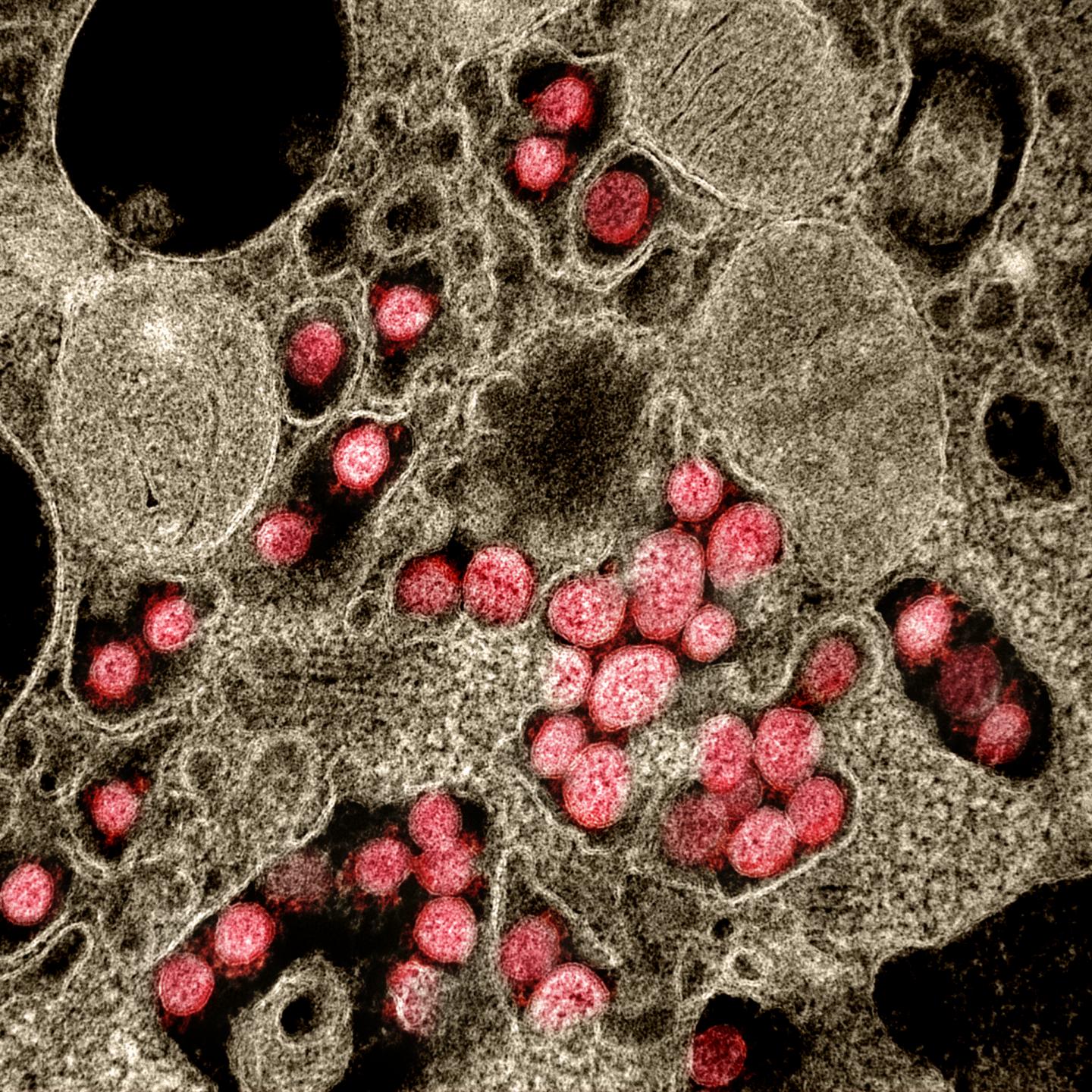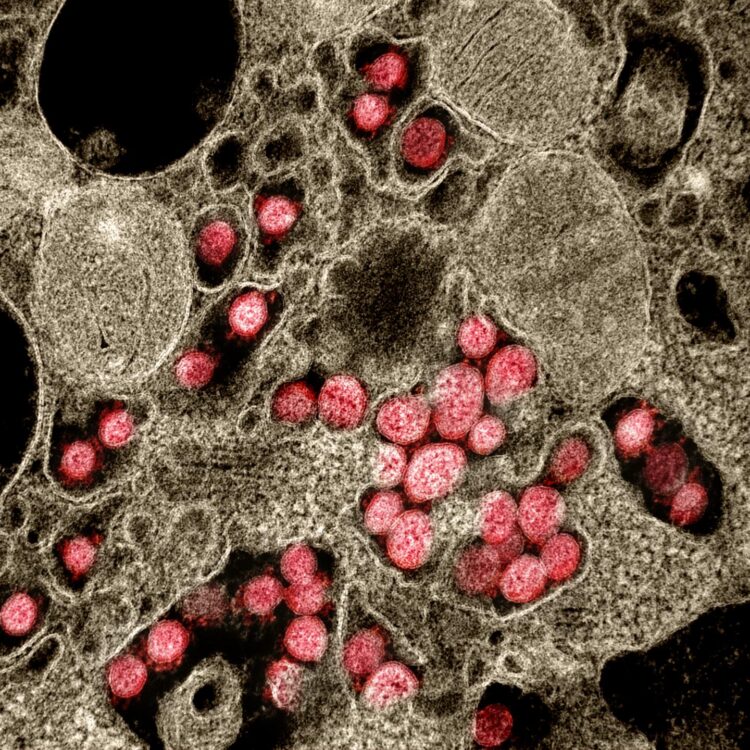
Credit: NIAID
A clinical trial is underway to determine whether people who are highly allergic or have a mast cell disorder are at increased risk for an immediate, systemic allergic reaction to the Moderna or Pfizer-BioNTech COVID-19 vaccines. A systemic allergic reaction to a vaccine occurs in one or more parts of the body beyond the injection site. If such an allergic reaction occurs in study participants, investigators will assess whether the reactions are more frequent in participants who are highly allergic or have a mast cell disorder than in participants with no allergic history. In addition, investigators will examine the biological mechanism behind the reactions and whether a genetic pattern or other factors can predict who is at most risk.
A mast cell disorder is a disease caused by a type of white blood cell called a mast cell that is abnormal, overly active, or both, predisposing a person to life-threatening reactions that look like allergic reactions.
“The public understandably has been concerned about reports of rare, severe allergic reactions to the Moderna and Pfizer-BioNTech COVID-19 vaccines,” said Anthony S. Fauci, M.D., director of the National Institute of Allergy and Infectious Diseases (NIAID), part of the National Institutes of Health. “The information gathered during this trial will help doctors advise people who are highly allergic or have a mast cell disorder about the risks and benefits of receiving these two vaccines. However, for most people, the benefits of COVID-19 vaccination far outweigh the risks.”
The Phase 2 trial, called Systemic Allergic Reactions to SARS-CoV-2 Vaccination, is sponsored and funded by NIAID. The vaccines are being provided by the program led by the U.S. Department of Health and Human Services and the U.S. Department of Defense to develop COVID-19 vaccines and therapeutics. The vaccines are manufactured by Moderna, Inc. of Cambridge, Massachusetts and Pfizer, Inc. of New York.
The Moderna and Pfizer-BioNTech COVID-19 vaccines are the first two COVID-19 vaccines authorized by the Food and Drug Administration for emergency use and already have been given to millions of Americans. Most of the rare, severe allergic reactions to these vaccines have occurred in people with a history of allergies. A substantial number of these people had previously experienced a life-threatening allergic reaction called anaphylaxis.
The study team will enroll 3,400 adults ages 18 to 69 years at up to 35 academic allergy-research centers nationwide. About 60% of study participants, group 1, must have either a history of severe allergic reactions or a diagnosis of a mast cell disorder, while 40% of participants, group 2, will not. The specific types of allergic reactions in group 1 participants are related to food, insect stings or allergen immunotherapy and require treatment with a drug called epinephrine; or are immediate allergic reactions to a vaccine or to one or more drugs. These reactions will have occurred within the past 5 years. Group 2 will consist of people with no history of any allergic reactions or allergic disease and no history of a mast cell disorder. Approximately two-thirds of participants in each group will be female, because severe allergic reactions to vaccines in general?and to the Moderna and Pfizer-BioNTech COVID-19 vaccines in particular?have occurred mainly in women.
Participants in each group will be assigned at random to receive either the Pfizer-BioNTech vaccine (one third of the group); the Moderna vaccine (one third); a placebo followed by the Pfizer-BioNTech vaccine (one sixth); or a placebo followed by the Moderna vaccine (one sixth). Initially, neither the participants nor the study team will know who is receiving a vaccine or placebo, or which vaccine is being administered. All participants ultimately will receive a full two-dose course of either the Pfizer-BioNTech vaccine or the Moderna vaccine.
The site investigators are allergists trained to recognize and treat anaphylaxis. Emergency medications, oxygen and medical equipment will be on hand to treat allergic reactions as needed. Participants will be observed for at least 90 minutes after each injection in case any type of reaction occurs.
Three days after their first injection, participants will receive a follow-up call from the study team to schedule their next injection in 21 or 28 days. Three days after the second injection, participants who did not receive a placebo will be told during a follow-up call that they received a vaccine and which one, while participants who initially received a placebo will be scheduled for their second dose of vaccine. Study staff will assess participants’ health during follow-up calls. All participants will receive their final follow-up call seven days after their last dose.
Investigators will assess the proportion of study participants in each group who have a systemic allergic reaction within 90 minutes after injection with either dose of the Pfizer-BioNTech vaccine or either dose of the Moderna vaccine. Results are expected in late summer 2021.
Study staff will collect blood, urine and nasal swabs from participants before each injection, and blood and urine after each injection. If a significant number of systemic allergic reactions to either or both vaccines occur during the trial, investigators will analyze these biological samples to examine possible mechanisms for the reactions and whether certain genetic patterns are associated with higher risk.
Investigators will closely monitor participants’ safety throughout the trial. In addition, an independent data and safety monitoring board (DSMB) will review blinded and unblinded study data at scheduled review meetings to further ensure the safety of study participants.
###
The Systemic Allergic Reactions to SARS-CoV-2 Vaccination trial is co-chaired by N. Franklin Adkinson, Jr., M.D.; James R. Baker, Jr., M.D.; and Rebecca S. Gruchalla, M.D., Ph.D. Dr. Adkinson is a professor of medicine and director of the graduate training program in clinical investigation at the Johns Hopkins Asthma & Allergy Center in Baltimore. Dr. Baker is director of the Mary H. Weiser Food Allergy Center and is the Ruth Dow Doan Professor of Biologic Nanotechnology at Michigan Medicine in Ann Arbor. Dr. Gruchalla is a professor of internal medicine and pediatrics and chief of the divisions of allergy and immunology in the departments of internal medicine and pediatrics at the University of Texas Southwestern Medical Center at Dallas.
For more information about the trial, including a list of sites that are enrolling participants, please go to ClinicalTrials.gov and search under study identifier NCT04761822.
Adults interested in participating in this trial should visit ClinicalTrials.gov and search under identifier NCT04761822 for study locations and contacts. Please do not use the NIAID media phone number or email address to try to enroll in this trial.
Media Contact
NIAID Office of Communications
[email protected]
Original Source
https:/





